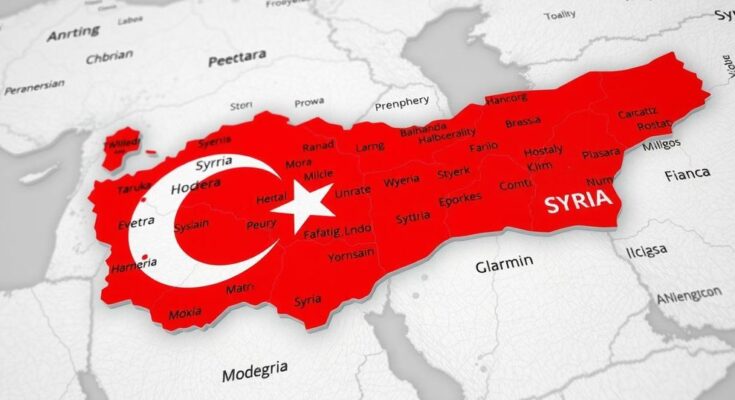Turkey’s military operations in Syria have rapidly shifted the power dynamics, leading to significant territorial gains against Assad’s regime. By advocating for political dialogue and governance models, Turkey aims to solidify its influence. The return of Syrian refugees and relations with Kurdish factions remain critical issues. The upcoming reconstruction phase poses substantial financial and logistical challenges, with Turkey poised to lead regional efforts.
In recent weeks, Turkey’s military operations in Syria have significantly shifted the balance of power against Bashar al-Assad’s government, which was predicted to fall in the face of rebellion. Although earlier technical operations aimed at alleviating the humanitarian crisis in Idlib, Turkey’s forces unexpectedly advanced, capturing key cities in a matter of days, thus establishing Turkey as a dominant force in the region.
The evolving role of Turkey is underscored by Ankara’s calls for dialogue intended to stabilize Syria’s governance post-Assad, advocating for a structure that maintains existing state institutions. The leader of Hay’at Tahrir al-Sham, Abu Mohammad al-Jolani, has thus far committed to a political framework that includes all sects, demonstrating a potential for a balanced approach despite his group’s turbulent history.
Khaled Khoja, a former president of the National Coalition for Syrian Revolutionary and Opposition Forces, asserts Turkey’s profound influence throughout this operation, stating that “it’s a very sterile revolution.” With support from Turkish officials, Jolani has enacted measures mimicking long-discussed concepts involving Russian cooperation, indicating strategic foresight from Ankara.
Turkey’s regional ambitions include facilitating reconciliation among diverse Syrian opposition factions and establishing a transitional government that represents all groups. The establishment of local governance structures in Turkish-controlled areas serves as a model for potential governance in a post-Assad Syria, with Turkey looking to play a critical role in administration and capacity building.
Furthermore, Turkey confronts the issue of the Syrian Democratic Forces (SDF), predominantly Kurdish, exerting influence over crucial resources in eastern Syria. Analysts, including Can Acun, express concerns regarding SDF control in Arab-majority areas and suggest that military interventions might be warranted to address these issues.
The return of Syrian refugees from Turkey remains a pressing concern, particularly for the over three million currently sheltering there, with many originating from the Aleppo region. Economic integration efforts are underway with the reopening of factories in Aleppo and logistical corridors being established to facilitate the return of displaced persons.
As Syria approaches a critical stage of reconstruction, Khoja estimates that the restoration efforts may demand an estimated $360 billion. Turkey is expected to coordinate these initiatives alongside Islamic organizations and Gulf countries in the rehabilitation of Syria’s war-torn infrastructure.
Turkey’s recent military actions in Syria, marked by the rapid capture of multiple cities, have shifted its strategic positioning and influence in the ongoing conflict. The situation arose against a backdrop of weakened resistance from the Syrian government and a tactical awareness of Turkey regarding the shifting global focus, particularly with Russia diverting its attention to the Ukraine war. In this context, Turkey seeks to carve out a significant role in establishing a stable governance model in post-Assad Syria, leveraging its historical support for the Syrian opposition and managing complex relations with various factions, including HTS and the SDF.
In summary, Turkey’s recent military escalation in Syria marks a critical juncture in the country’s complex political landscape. By influencing local governance and advocating for a transitional government, Turkey aims to consolidate its position while addressing key regional challenges. Continued tensions with the SDF and the significant task of rehabilitating the Syrian infrastructure following years of conflict remain pivotal for the long-term stability that Turkey envisions for both itself and the Syrian populace.
Original Source: www.middleeasteye.net




